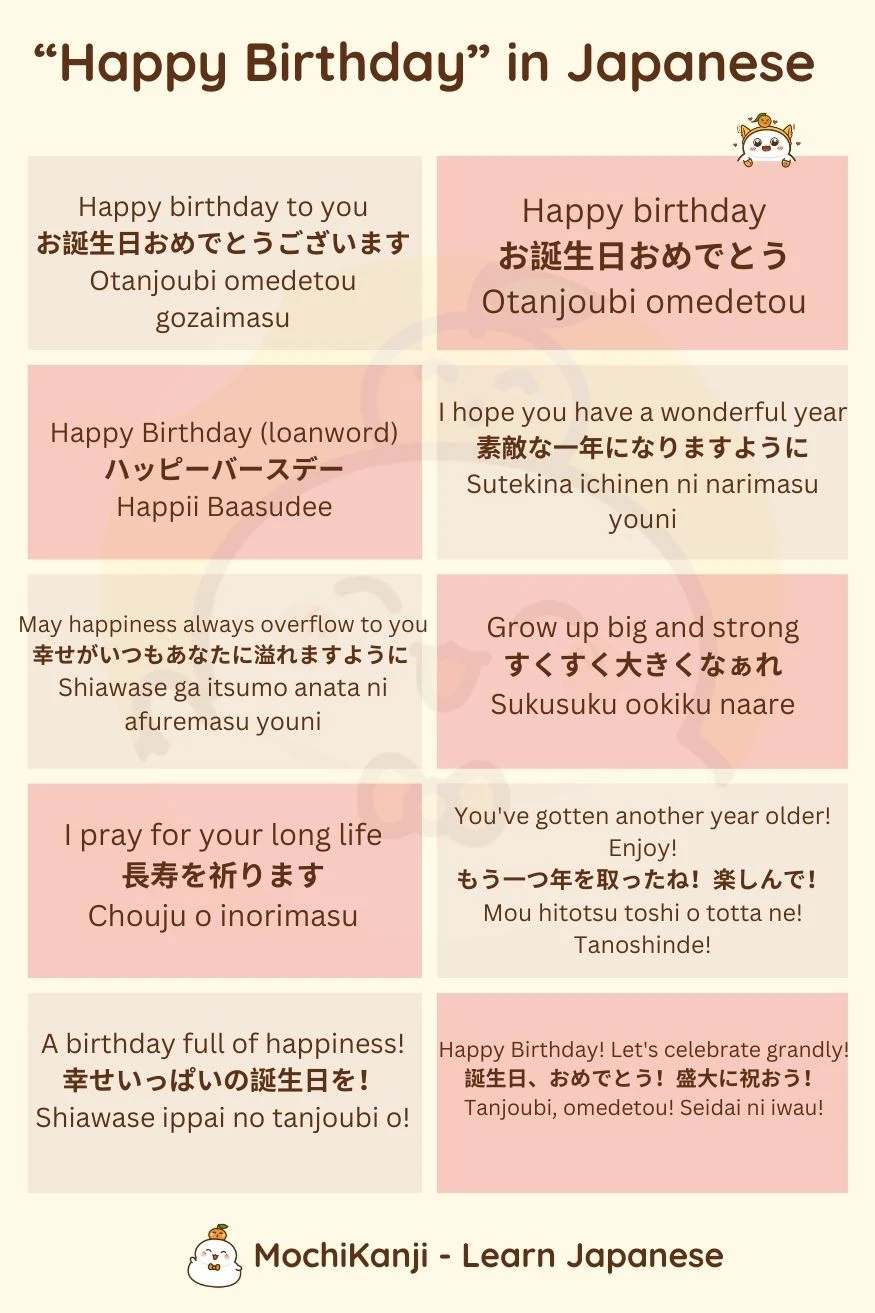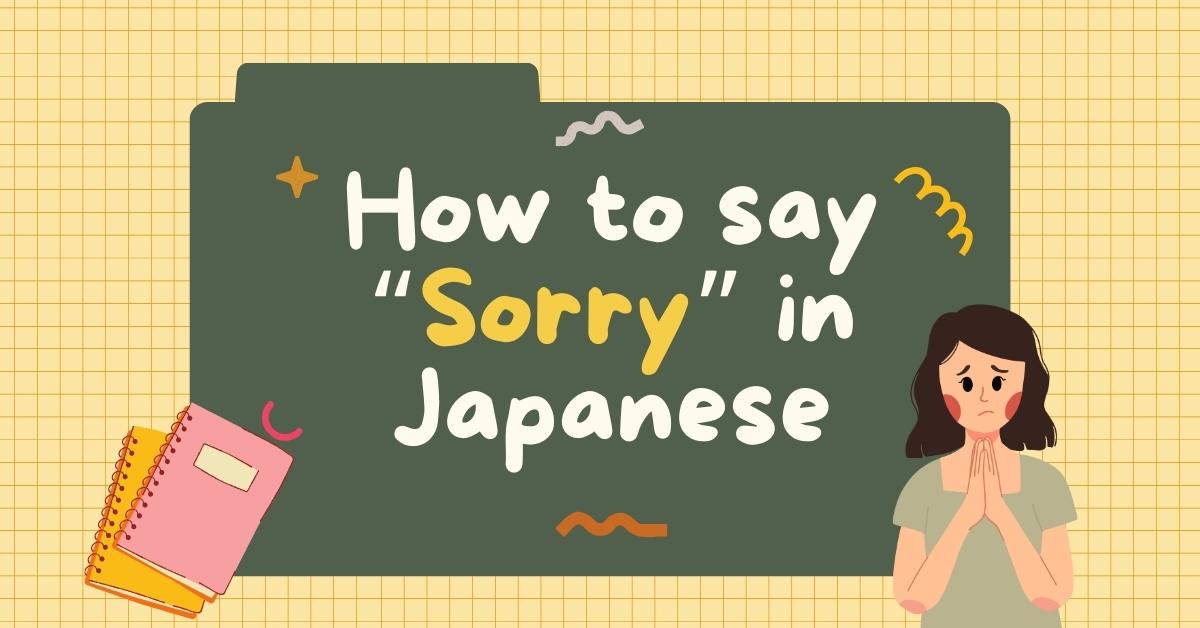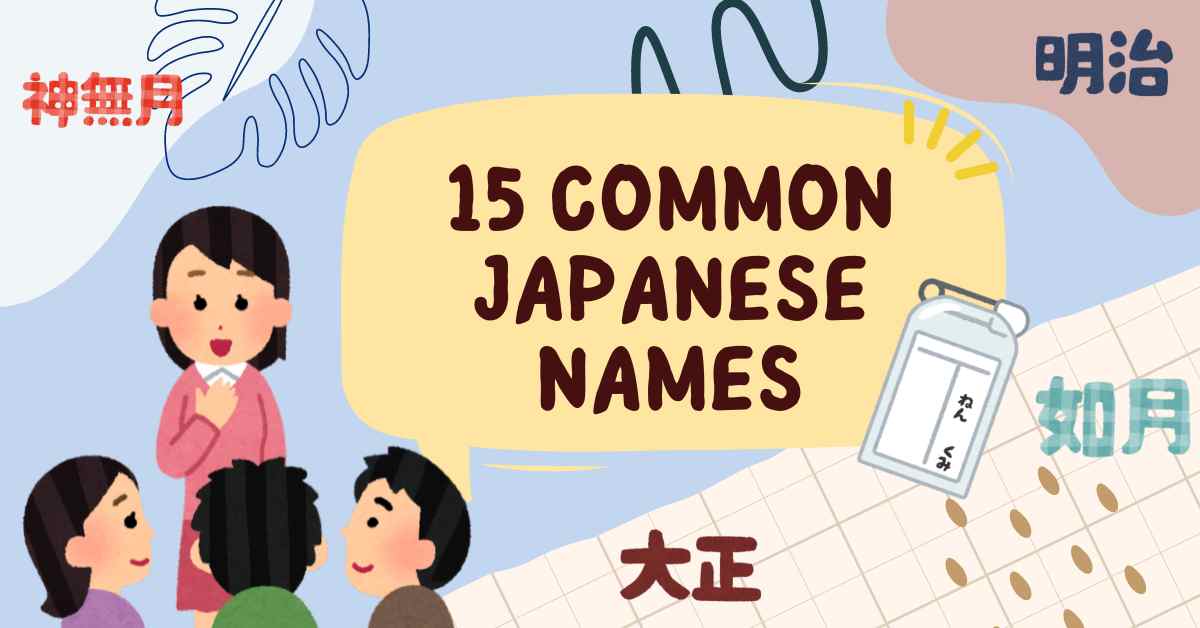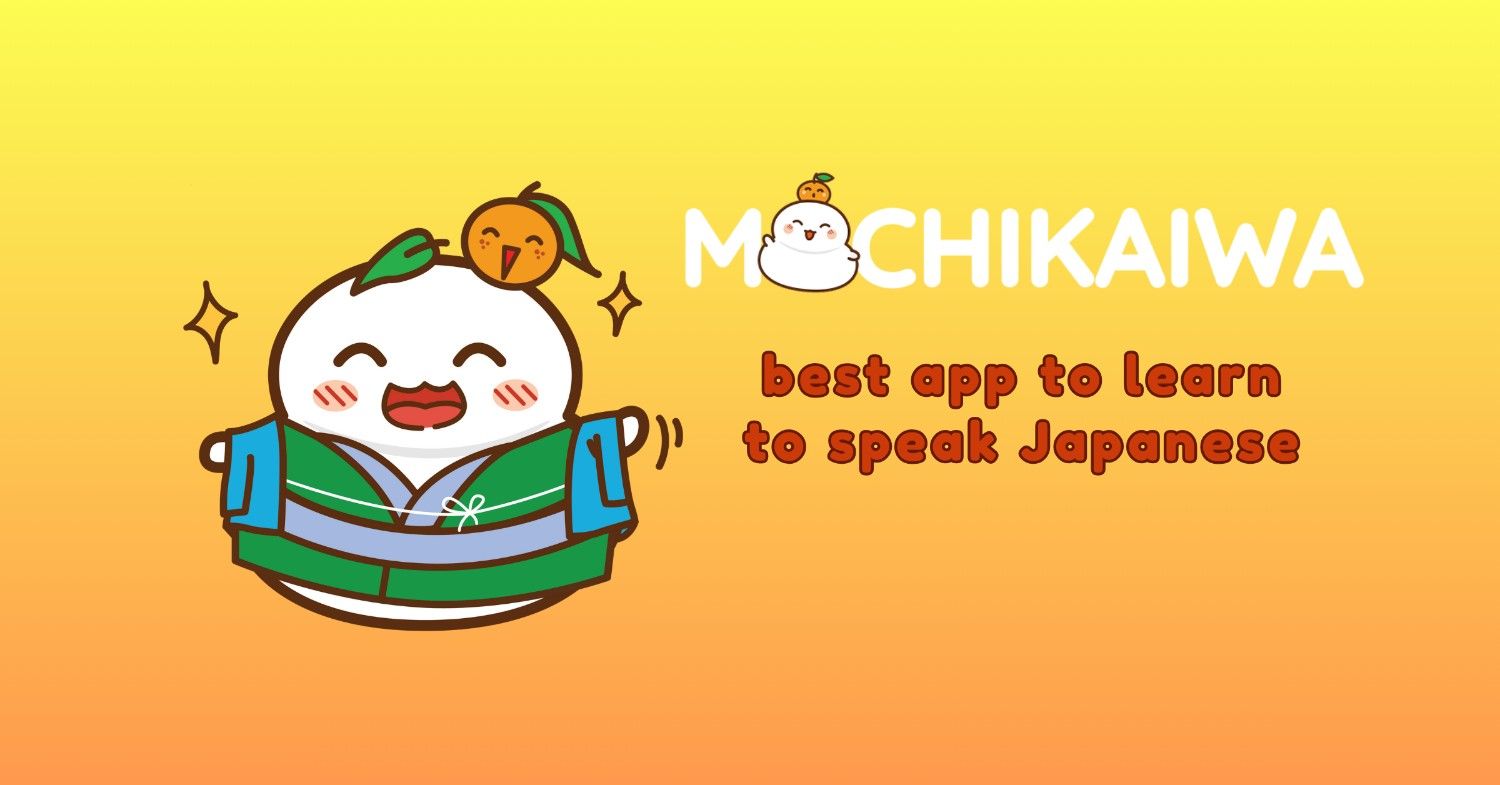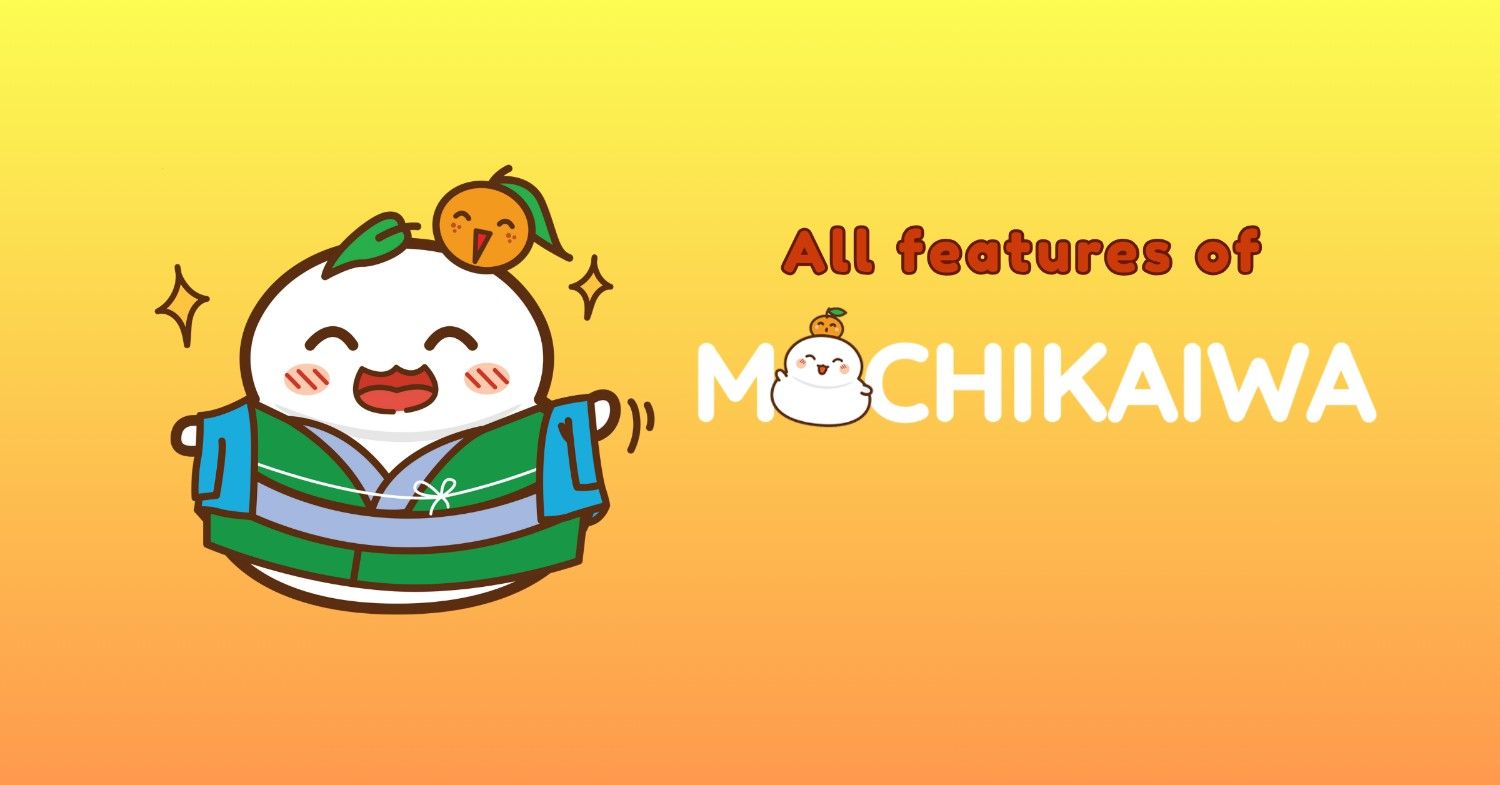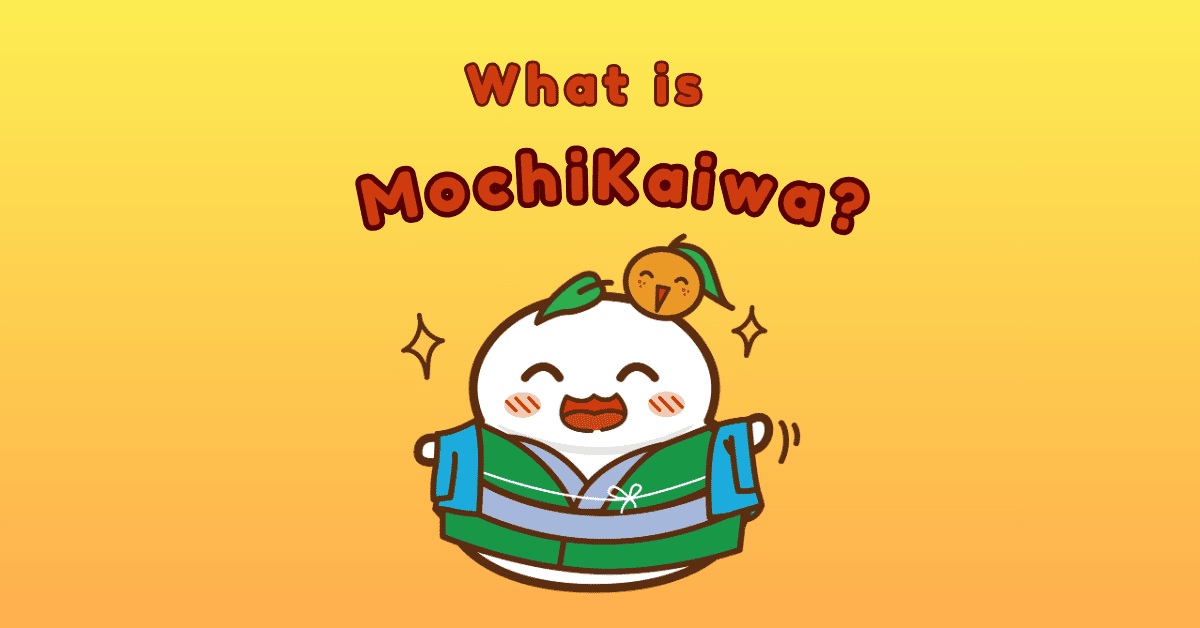In Japanese, “Happy Birthday” is お誕生日おめでとう (Otanjoubi omedetou), the phrase can be translated into “congratulations on your date of birth”. This is the most basic wish Celebrating a birthday is a universal joy, and conveying birthday wishes in Japanese adds a unique and thoughtful touch to the festivities. Whether you are living in Japan, have Japanese friends, or simply love the culture, knowing how to express birthday greetings in Japanese is both endearing and respectful.
- 10 ways to say “Happy Birthday” in Japanese
- The Japanese “Happy Birthday” song
- Modern birthday celebrations
- Japanese vocabulary about birthday and how to master them
- FAQs

10 ways to say “Happy Birthday” in Japanese
1. お誕生日おめでとうございます – Otanjoubi omedetou gozaimasu: Standard birthday greeting
- Meaning: Happy birthday to you
- Usage: This is the most common and formal way to wish someone a happy birthday in Japan. Suitable for both close friends and acquaintances, it’s respectful and can be used in any setting.
2. お誕生日おめでとう – Otanjoubi omedetou: Casual greeting for friends
- Meaning: Happy birthday
- Usage: This is a less formal version of the standard greeting and is perfect for casual settings among friends. It carries a warm and friendly tone.
3. ハッピーバースデー – Happii baasudee: For someone very close
- Meaning: Happy Birthday (English loanword)
- Usage: Interestingly, the English phrase “Happy Birthday” is also used in Japan, especially among close friends and particularly with younger generations. It adds a trendy, Western flavor to the celebration.
4. 素敵な一年になりますように – Sutekina ichinen ni narimasu youni: Adding a wish
- Meaning: I hope you have a wonderful year
- Usage: This phrase means “I hope you have a wonderful year.” It’s a lovely addition to any birthday greeting, expressing a heartfelt wish for the year ahead.
5. 幸せがいつもあなたに溢れますように – Shiawase ga itsumo anata ni afuremasu youni: A poetic touch
- Meaning: May happiness always overflow to you
- Usage: Translating to “May happiness always overflow to you,” this poetic phrase is perfect when you want to add emotional depth to your birthday wishes.
You can learn more interesting greetings at MochiKanji’s communication course.
6. すくすく大きくなぁれ – Sukusuku ookiku naare: For children
- Meaning: Grow up big and strong
- Usage: This cute expression is used to wish growth and health for children, implying “grow up big and strong.”
7. 長寿を祈ります – Chouju o inorimasu: Wishing longevity
- Meaning: I pray for your long life
- Usage: This is a respectful and thoughtful wish for older adults, wishing them a long life.
8. もう一つ年を取ったね!楽しんで!- Mou hitotsu toshi o totta ne! Tanoshinde!: Humorous and light-hearted
- Meaning: You’ve gotten another year older! Enjoy!
- Usage: Translating to “You’ve gotten another year older! Enjoy!” this phrase is light-hearted and fun, suitable for good friends.
9. 幸せいっぱいの誕生日を!- Shiawase ippai no tanjoubi o!: Combining wishes
- Meaning: A birthday full of happiness!
- Usage: Meaning “A birthday full of happiness!” this cheerful wish combines well-wishes with the celebratory mood of a birthday.
10. 誕生日、おめでとう!盛大に祝おう! – Tanjoubi, omedetou! Seidai ni iwau!: Celebratory cheer
- Meaning: Happy Birthday! Let’s celebrate grandly!
- Usage: This phrase is perfect for expressing enthusiasm and excitement about celebrating the person’s birthday, especially during a party or gathering. It’s informal and best used among friends.
The Japanese “Happy Birthday” song
One fun way to surprise a Japanese friend on their birthday is by singing the happy birthday song in Japanese. Like the well-known “Happy Birthday” song in English, Japan has its own version, set to the same tune:
- Lyrics: ハッピーバースデートゥーユー、ハッピーバースデートゥーユー、ハッピーバースデー、〔name〕、ハッピーバースデートゥーユー。
- Usage: Sing this song at birthday parties just as you would in the West, replacing “[name]” with the birthday person’s name. It’s a fun and engaging way to celebrate.
Modern birthday celebrations
Today, Japanese birthday parties often mirror Western celebrations, especially among younger generations. These include birthday cakes, candles, parties, and singing the “Happy Birthday” song. Despite these Western influences, Japanese birthday celebrations often retain unique cultural elements:
1. Birthday cake
The centerpiece of a Japanese birthday celebration is undeniably the cake. Traditionally, it’s a stunning sponge cake, meticulously decorated and topped with whipped cream and fresh strawberries. Further personalizing the experience, the cake often features the recipient’s name and a celebratory message, such as “お誕生日おめでとう” (Otanjoubi omedetou), which translates to “Happy Birthday.”
2. Gift giving
Gift-giving is an essential part of Japanese culture, and birthdays are no exception. However, the gifts are often wrapped exquisitely and given with a great sense of respect and consideration. Popular gifts include items that the recipient can consume or use up, such as food, beverages, or bath products, reflecting the Japanese aesthetic of transient beauty.
3. A birthday card
Writing a birthday card in Japanese is another meaningful way to express your best wishes. Here’s how to do it.
Starting the card: お誕生日おめでとう (Otanjoubi Omedetou)
Start with the basic birthday greeting, “Otanjoubi Omedetou.”
Sharing memories and gratitude: 楽しい思い出と感謝 (Tanoshii Omoide to Kansha)
Express shared memories or gratitude by using “Tanoshii Omoide to Kansha,” which translates to “fun memories and gratitude.”
Concluding the card: これからもよろしくお願いします (Korekara mo Yoroshiku Onegaishimasu)
To end the card, you can use “Korekara mo Yoroshiku Onegaishimasu,” which is a common phrase expressing continued good relations.
4. Adult’s day (Seijin no Hi)
For many Japanese, a significant birthday celebration occurs at the age of 20. Seijin no Hi, or Coming of Age Day, is celebrated on the second Monday of January. New adults participate in ceremonies across the country, wearing traditional dress such as kimonos for women and hakama for men, to mark their transition into adulthood.
5. Shichi-Go-San
Although not a birthday, Shichi-Go-San (7-5-3 Festival) is a traditional rite of passage for children aged three, five, and seven, celebrated in November. Parents dress their children in kimonos and visit shrines to pray for their health and prosperity. This celebration underscores the importance of specific years in a child’s growth.
6. Respect for the elderly
Deeply ingrained in Japanese culture is a strong respect for elders. This reverence extends to milestone birthdays, such as 60th (kanreki), 70th (koki), and 88th (beiju), which are celebrated with particular significance. These special occasions often involve specific traditional practices and gifts that symbolize longevity and the wisdom gained through life’s experiences.
Now, you can say “お誕生日おめでとう” in your friend’s birthday!
Japanese vocabulary about birthday and how to master them
A birthday is a special occasion to celebrate someone as they turn a new age. Japanese culture respects birthdays, and many unique customs and traditions surround them. Therefore, learning Japanese vocabulary related to birthdays will not only enhance your communication with native speakers, but also allow you to participate in these celebrations in a more meaningful way.
Here are some common Japanese vocabulary related to birthday celebrations:
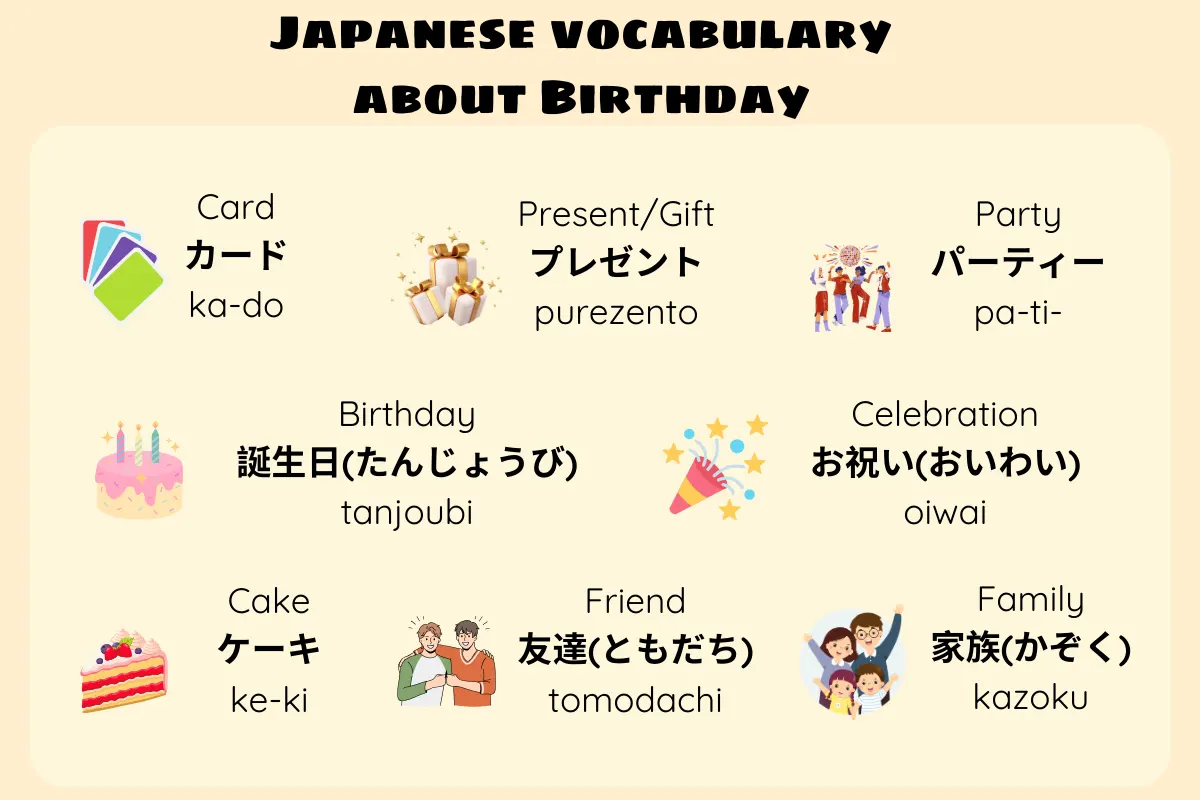
- カード (kaado) – Card
- プレゼント (purezento) – Gift
- パーティー (pa-ti-) – Party
- 誕生日 (tanjoubi) – Birthday
- お祝い (oiwai) – Celebration
- ケーキ (keeki) – Cake
- 友達 (tomodachi) – Friend
- 家族 (kazoku) – Family
Effective learning tips
To effectively learn and remember Japanese birthday-related vocabulary, consider the following detailed strategies:
- Use Spaced Repetition: Spaced repetition is a learning technique that involves reviewing information at increasing intervals. The repeated presentation of information over time, as opposed to cramming it in a short period, enhances information retention according to the spacing effect.
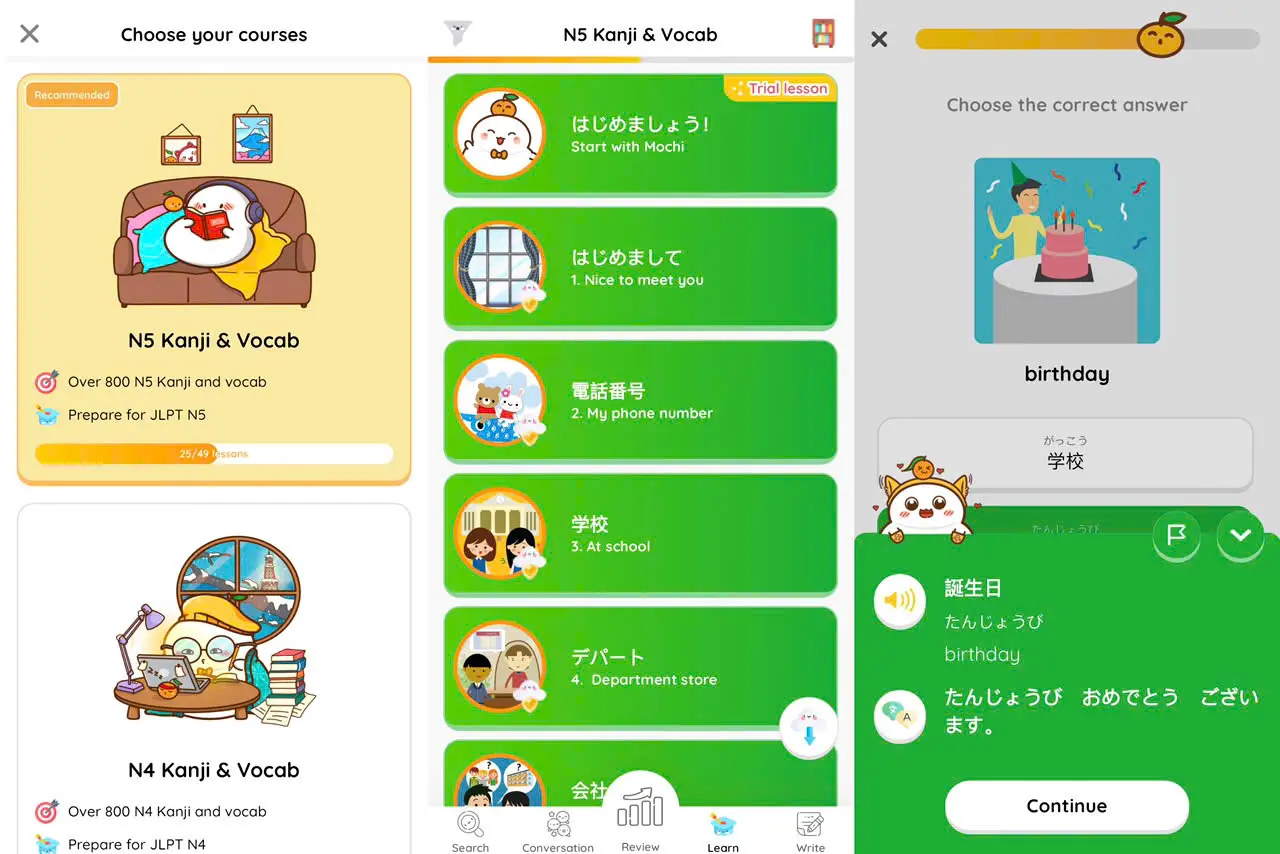
App like MochiKanji-Learn Japanese are ideal for spaced repetition, a technique that helps you retain information by reviewing words at increasing intervals, ensuring long-term memory retention. Moreover, MochiKanji also offers you various Japanese vocabulary learning courses with a diverse range of themes, you are free to choose one based on your liking.
Try it for free now!
- Contextual Practice: Incorporate new vocabulary into sentences and everyday conversations. Practice writing and speaking these words in relevant contexts, such as during actual birthday celebrations.
- Visual Aids: Create flashcards with images and kanji/hiragana on one side and the meaning on the other. This visual association aids memory.
- Regular Review: Dedicate a few minutes daily to review your vocabulary. Consistent practice is crucial for reinforcing what you’ve learned. Use resources like MochiKanji to keep track of your progress and ensure a steady learning pace.
By following these detailed tips and utilizing tools like MochiKanji, you can master Japanese birthday-related vocabulary efficiently and effectively
Birthday conversation examples
1. Simple birthday greeting
In a casual setting, you just want to wish someone a happy birthday.
Example:
A: Hey, it’s your birthday today, right?
B: Yep, it is!
A: Happy Birthday! I hope you have a fantastic day.
B: Thank you so much! I appreciate it.
2. Planning a birthday party
You’re making plans for a friend’s birthday party.
Example:
A: Hey, your birthday is coming up soon! Do you have any plans?
B: Not yet. I was thinking of maybe having a small party.
A: That sounds fun! Do you need any help organizing it?
B: Actually, yes! Could you help me with the invitations and decorations?
A: Of course! Let’s make it the best birthday party ever.
3. Receiving birthday gifts
Someone is giving you a gift on your birthday.
Example:
A: Happy Birthday! I got you something special.
B: Oh wow, you didn’t have to! What is it?
A: Open it and see!
B: [opens gift] Oh my gosh, this is amazing! Thank you so much, I love it.
A: I’m glad you like it. I thought it’d be perfect for you!
4. Wishing someone a happy birthday late
You missed someone’s birthday, but still want to wish them well.
Example:
A: Oh no, I totally forgot your birthday! I’m so sorry.
B: It’s okay, don’t worry about it!
A: Happy Belated Birthday! I hope you had a great day.
B: Thanks! It was nice and laid-back. Maybe we can grab coffee sometime to celebrate?
A: That sounds great! Let’s do it.
5. Talking about birthday plans
Discussing what you’ll do for someone’s birthday.
Example:
A: So, how are you celebrating your birthday this year?
B: I’m just having a small dinner with family and a few friends.
A: That sounds lovely! Do you need any help with the arrangements?
B: I think I’ve got everything covered, but thanks for offering!
A: No problem. I hope you have an amazing time!
6. Thanking people for birthday wishes
After receiving birthday messages from friends, you want to show your appreciation.
Example:
A: Hey, Happy Birthday!
B: Thanks a lot! I really appreciate all the messages.
A: You deserve them! Did you do anything fun today?
B: Yeah, I had a little celebration with family. It was really nice.
A: That’s awesome! Hope the rest of your day is great, too.
FAQs
Still have a few more queries or need a brief recap? (Can we just say, we love your thoroughness!) Here are the answers to some frequently asked questions:
How do you wish someone a happy birthday in Japan?
The way you say “happy birthday” in Japanese depends on your relationship with the person. For close friends, a casual “tanjoubi omedetou” is perfectly acceptable. However, in more formal situations or when addressing someone you don’t know well, it’s best to use the full phrase “o tanjoubi omedetou gozaimasu” to show respect. Interestingly, with the growing influence of Western culture, younger generations often use the informal English loanword “happy birthday” pronounced as “happy bazde.”
How do you say happy birthday in Japanese casually?
Japanese offers a spectrum of greetings for different social situations. For casual settings with close friends and family, you can use the most informal way to say “happy birthday” in Japanese: “otanjoubi omedetou” (お誕生日おめでとう). This conveys a warm and friendly tone. Nonetheless, if the situation is more formal or you’re addressing someone you don’t know well, it’s best to choose a more respectful option .
What does “omedetou gozaimasu” mean?
“Omedetou gozaimasu” is Japanese for ‘Congratulations.’ It’s a phrase you’d use to congratulate someone in their language.
How do Japanese birthdays written?
In Japanese, birthdays are written as “誕生日” (たんじょうび – tanjoubi). You typically write the full date in the format “年/月/日” (year/month/day). For example, September 17, 2024, would be written as “2024年9月17日”
How do Japanese people sing “Happy Birthday?
In Japan, people sing “Happy Birthday” using the English lyrics but often in a Japanese accent. The song goes:
“Happy Birthday to You, Happy Birthday to You, Happy Birthday dear [Name], Happy Birthday to You.”
In Japanese, it’s common to use this English version, though some might say “お誕生日おめでとう” (O-tanjoubi omedetou) to wish someone a happy birthday.
What is the Japanese symbol for happy birthday?
The Japanese symbol for “happy birthday” is お誕生日おめでとう (otanjoubi omedetou). This phrase is commonly used to wish someone a happy birthday in Japan.
How do you say happy birthday in Japanese?
To say “happy birthday” in Japanese, you’d say “tanjōbi omedetō.”
How do you write the phrase “happy birthday” in Japanese?
One way to say “Happy Birthday” in Japanese is “お誕生日おめでとうございます,” which is pronounced o-tan-jōbi omedetō gozaimasu.
Now that you’ve mastered how to say “happy birthday” in Japanese, let’s embark on a further linguistic adventure! Delve into our other resources to learn even more essential phrases and expressions.

